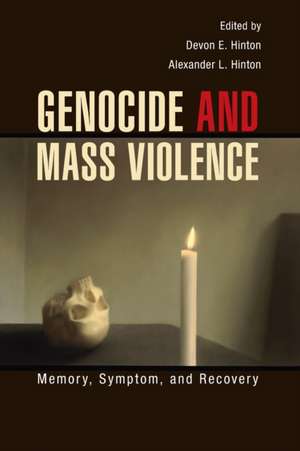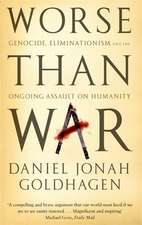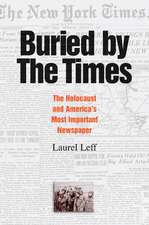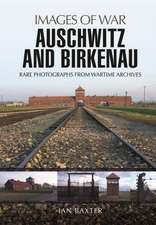Genocide and Mass Violence: Memory, Symptom, and Recovery
Editat de Devon E. Hinton, Alexander L. Hintonen Limba Engleză Paperback – 9 noi 2014
Preț: 294.57 lei
Nou
Puncte Express: 442
Preț estimativ în valută:
56.37€ • 61.21$ • 47.35£
56.37€ • 61.21$ • 47.35£
Carte tipărită la comandă
Livrare economică 22 aprilie-06 mai
Preluare comenzi: 021 569.72.76
Specificații
ISBN-13: 9781107694699
ISBN-10: 1107694698
Pagini: 448
Ilustrații: 20 b/w illus. 11 tables
Dimensiuni: 152 x 228 x 25 mm
Greutate: 0.61 kg
Editura: Cambridge University Press
Colecția Cambridge University Press
Locul publicării:New York, United States
ISBN-10: 1107694698
Pagini: 448
Ilustrații: 20 b/w illus. 11 tables
Dimensiuni: 152 x 228 x 25 mm
Greutate: 0.61 kg
Editura: Cambridge University Press
Colecția Cambridge University Press
Locul publicării:New York, United States
Cuprins
Foreword: what does trauma do? Arthur Kleinman; Introduction: an anthropology of the effects of genocide and mass violence: memory, symptom, and recovery Devon E. Hinton and Alexander L. Hinton; Part I. Private and Public Memory: 1. The Vietnam War traumas Heonik Kwon; 2. Haunted by Aceh: specters of violence in post-Suharto Indonesia Byron J. Good; 3. Remembering and ill health in post-invasion Kuwait: topographies, collaborations, and mediations Conerly Casey; 4. 'Behaves like a rooster and cries like a (four-eyed) canine': the politics and poetics of depression and psychiatry in Iran Orkideh Behrouzan and Michael M. J. Fisher; 5. Embodying the distant past: Holocaust descendant narratives of the lived presence of the genocidal past Carol A. Kidron; 6. Half-disciplined chaos: thoughts on contingency, story, and trauma Vincent Crapanzano; Part II. Symptom and Syndrome: 7. 'The spirits enter me to force me to be a communist': political embodiment, idioms of distress, spirit possession, and thought disorder in Bali Robert Lemelson; 8. 'Everything here is temporary': psychological distress and suffering among Iraqi refugees in Egypt Nadia El-Shaarawi; 9. Key idioms of distress and PTSD among rural Cambodians: the results of a needs-assessment survey Devon E. Hinton, Alexander L. Hinton and Kok-Thay Eng; 10. Attack of the grotesque: suffering, sleep paralysis, and distress during the Sierra Leone war Doug Henry; Part III. Response and Recovery: 11. The chaplain turns to God: negotiating post-traumatic stress disorder in the American military Erin Finley; 12. Acehnese women's tales of traumatic experience, resilience, and recovery Mary-Jo Delvecchio Good; 13. Rwanda's Gacaca trials: toward a new nationalism or business as usual? Christopher C. Taylor; 14. Pasts imperfect: talking about justice with former combatants in Colombia Kimberly Theidon; 15. Atrocity and nonsense: the ethnographic study of dehumanization Alexandra Pillen; 16. Growing up on the frontline: coming to terms with war-related loss in Gonagala, Sri Lanka Kenneth E. Miller and Sulani Perera; 17. The role of traditional rituals for the reintegration and psychosocial well-being of child soldiers in Nepal Brandon Kohrt; Commentary: wrestling with the angels of history: memory, symptom, and intervention Laurence J. Kirmayer.
Recenzii
'Fascinating, compelling and challenging, Genocide and Mass Violence is terrific for reading and teaching. Trauma is one of the great topics of our age, yet we still do not understand trauma deeply, and its effects are contested and debated. This collection gives us evidence and arguments to help us form our own perspective on mass violence and its long-term consequences. One of the most interesting collections of anthropological essays I have read in years.' Tanya Marie Luhrmann, Stanford University
'This outstanding collection of articles uses cross-disciplinary and cross-cultural approaches to explore the emotional, social and political consequences of mass violence, including community efforts at reconciliation and healing. The collective effort is admirable in many ways, but especially in its grounding of complex psychosocial and political issues in the ethnography of people's everyday lives.' Douglas W. Hollan, University of California, Los Angeles
'This collection will make the reader uncomfortable and evoke powerful emotions. It compels us to not just contemplate the aftermath of unspeakable violence and blood-chilling events, but to consider the trauma that survivors must contend with as they try to live in the present and build a future. Drs Hinton and Hinton ask us to step outside our comfort zone and imagine the challenges victims of genocide face while trying to regain faith in humanity, trust in social institutions, and develop a sense of security in a troubled world.' Mark Nichter, Regents' Professor and Professor of Anthropology, Public Health and Family Medicine, University of Arizona
'Trauma has become a major figure, both psychological and moral, in the contemporary understanding of the consequences of mass violence. It is the great merit of Drs Hinton and Hinton to bring together compelling and insightful case studies from around the world, thus allowing for a pioneering global perspective on the juncture between suffering and memory.' Didier Fassin, James D. Wolfensohn Professor, Institute for Advanced Study
'Genocide and Mass Violence is an extremely successful volume that not only brings together an amazing and interesting collection of research and collaborators but forces the reader to consider how experiences of violence continue to unfold beyond the battlefield. Its cross-disciplinary approach gives the reader new insights and perspectives that would otherwise be lacking from a single-field examination and produces a truly unique work.' Anthropos
'This outstanding collection of articles uses cross-disciplinary and cross-cultural approaches to explore the emotional, social and political consequences of mass violence, including community efforts at reconciliation and healing. The collective effort is admirable in many ways, but especially in its grounding of complex psychosocial and political issues in the ethnography of people's everyday lives.' Douglas W. Hollan, University of California, Los Angeles
'This collection will make the reader uncomfortable and evoke powerful emotions. It compels us to not just contemplate the aftermath of unspeakable violence and blood-chilling events, but to consider the trauma that survivors must contend with as they try to live in the present and build a future. Drs Hinton and Hinton ask us to step outside our comfort zone and imagine the challenges victims of genocide face while trying to regain faith in humanity, trust in social institutions, and develop a sense of security in a troubled world.' Mark Nichter, Regents' Professor and Professor of Anthropology, Public Health and Family Medicine, University of Arizona
'Trauma has become a major figure, both psychological and moral, in the contemporary understanding of the consequences of mass violence. It is the great merit of Drs Hinton and Hinton to bring together compelling and insightful case studies from around the world, thus allowing for a pioneering global perspective on the juncture between suffering and memory.' Didier Fassin, James D. Wolfensohn Professor, Institute for Advanced Study
'Genocide and Mass Violence is an extremely successful volume that not only brings together an amazing and interesting collection of research and collaborators but forces the reader to consider how experiences of violence continue to unfold beyond the battlefield. Its cross-disciplinary approach gives the reader new insights and perspectives that would otherwise be lacking from a single-field examination and produces a truly unique work.' Anthropos
Descriere
Genocide and Mass Violence brings together a unique mix of anthropologists, psychiatrists, psychologists and historians to examine the effects of mass trauma.












